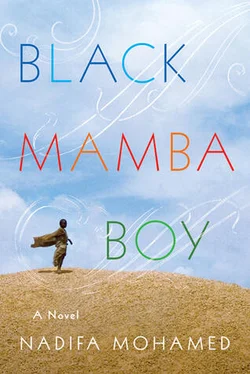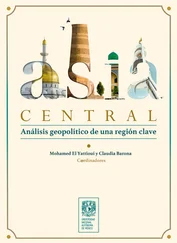Amina’s husband held up a finger. “Jama, let me tell you one thing, while you stay with us, ignore everything this woman says. I swear she is the most ignorant woman you will ever find, she thinks that you make mules by mating donkeys with dogs.” Amina and her husband both cackled at each other’s insults.
Idea prepared that night’s dinner, and it was the best food Jama had ever tasted, fresh spicy fish served with warm, honeyed roti, a dip made from crushed dates, and another sauce of softened banana. Jama picked at the fish bones until there was nothing left on them. It was a world beyond the slop that the male cooks in eating houses served, and Idea looked delighted at the impact that it made on his guest. “Jama, I bet you have never eaten fish before, eh? Just rice and a little bit of camel or lamb. We Somalis have such a wide coast but we hate fish, why is this?” asked Idea ruminatively.
“I have eaten it before! We used to steal anything we wanted from the cafés in Aden.”
“Good for you, but Jama, I see nomads — Somali and Afar to be fair — holding their noses! Actually holding their noses as they walk past the fish market, and you can see their stomachs caved in with hunger! By God, it makes no sense!”
Jama, feeling full and content, leaned back, his stuffed stomach poking into the air. The paraffin lamp was lit and the adults stayed up talking softly into the amber-lit night. The last thing Jama noticed was a downy cotton sheet being laid over him.
In the morning, piercing white light flooded through the window. Jama dozed while Idea opened the curtains, swept the floor, prepared anjeero, and sang songs in different tongues. He was already dressed in a crumpled European shirt and trousers that swung a little above his ankles, thick-strapped brown leather sandals on his feet. Amina had left for work and Idea bumbled around the room, looking at a loss. “So, Jama, what are we going to do today?” said Idea, flicking his hands as if he were scattering his words over Jama, who looked around the room, at the stack of dusty books in the corner, torn pages sticking out of them, at the clothes neatly folded on a shelf, at the pretty gilt-edged mirror with black dots on its surface, and shrugged his shoulders. They sat looking at each other for a minute before Idea said, “Come on, get washed up, I’ll show you around town.” Jama washed his face, brushed his teeth with his finger, and poured some water over his chest and arms.
“The tour will start here from my house, the center of my world,” declared Idea in a clear, authoritative voice. “This mosque ahead of us was built by the Ottomans, heard of them? No? The descendants of Usman, those plump Turkish lords of the east and west. The little flags are meant to represent Islam’s power in all four corners of the world.
“This alley leads to Boulevard de Bender, where our resourceful women sell everything from green chilies to stuffed cobras, pomegranates and leopard skins, medicines and love potions, absolutely everything,” boomed Idea. “I’m sure there are probably even a few souls to be found. There are definitely bodies; the Arabs here sell little boys your age to their cousins over the sea.”
“Do you miss being a teacher?” Jama asked.
Idea stopped walking and looked down on Jama. “No. When I was a teacher I was working for people who had no respect for me or anyone like me.”
An old beggar woman leaned on a stick by the mosque wall, her raisin black hand held silently out to them. A young boy sat by her feet, a solitary leg emerging from his dirty shorts, his hair and eyelashes dust-matted. Idea passed a coin to the old woman. “Come on, I’ll show you the sadhu.” Idea picked up his step, rushing through the alley as its nighttime corruption faded into daylight commerce. Bras were removed languidly from balconies and curtains were drawn as the port women bade farewell to the sailors and retired for the day. Idea moved around like a sniffer dog, barely looking up as he shuffled along, until they reached an open road with taxis buzzing by. In between a shop called Punjabi Fabrics and a scrum of black-market, female money changers was one of the strangest sights Jama had ever seen. An Indian man, naked apart from a strip of cloth around his privates, sat on a crate with his feet pressed into his lean thighs. Orange markings were pasted on his forehead and his long white hair was coiled in a snake’s nest on his head. The sadhu’s eyes were serenely closed; a fat hand-rolled cigarette burned in his left hand, smelling musky and herbal. Jama touched the sadhu’s foot lightly with his fingertips, hoping that the mystic’s flesh would bring him luck or perhaps ignite the good fortune he was said to possess.
“Come on, Jama, on to Plateau du Serpent,” shouted Idea. Beyond the cafés and offices of Place Menelik were the colonial residences, and Idea was keen to walk through this forbidden part of town.
Idea pointed down to the road, which suddenly became tarred as it approached the European houses. “Take note, Jama, take note of all the little differences.”
Jama had had many bad experiences with bawabs when he went to admire the big houses in the European settlement in Aden, but Idea had no fear of them. He raised his arm and shouted “Hoi-hoi” at the uniformed Africans guarding the grand houses. They did not respond; staves in hand, they watched Jama and Idea with hostile eyes.
Idea took a deep breath. “My boy, this is a sad, sordid place. Everything, everyone can be bought here, the poor live above open sewers while the rich frolic in those European hotel pools, gormless, mindless, empty people. The French have us in their palms, feeding us, curing us, beating us, fucking us as they please.”
Jama wasn’t sure what Idea wanted to show him but he was getting nervous that the police would come. Idea took Jama’s hand and they crossed the road to a fenced garden. “Look at that, Jama.”
Under the shade of palm trees hung two swings, a wooden slide led into a sand pit, an empty merry-go-round spun with the breeze. Idea picked Jama up under his legs and threw him over the fence. “Go and play,” he ordered. Jama was caught between childish excitement and adolescent embarrassment, but he obeyed. He tested his weight against the swings then started to push himself a little, worried that he would break the rope and be arrested.
“Go to the other one now,” Idea called out.
Jama slid down into the sand pit and then got into the merry-go-round and pushed uncertainly, not sure what the machine was meant to do. A Somali ayah came along with a flame-haired baby in a crow black carriage; an old Indian ayah led a young boy by the hand. The European children were stopped by neighbors who ruffled their hair and rubbed imaginary marks off their skin. Already the children expected to be fussed over and adored and did not smile at the attention. Jama knew that everywhere they went they would be offered good things even though they wanted for nothing. In the shops in Aden, Indian merchants would not allow Somali children over the threshold, while Ferengi children ran in and demanded sweets and toys from Uncle Krishna.
“I’ve had enough now, Idea.” Jama extricated himself from the merry-go-round and climbed over the fence. Idea seemed satisfied that he’d made his point, and he held out his hand for Jama to hold, but Jama didn’t take it, he wanted Idea to know that he was a young man, not a child.
The house was filled with a drowning silence, as if there were things going on far away but the sound of them was submerged under meters of water. Jama got up and walked out of the house. He had slept late; the sun was approaching its zenith. He hoped that Idea had gone to the suq as his stomach was already rumbling. Jama walked absentmindedly through the gloomy room and stared at his reflection in the mottled tin mirror. His eyes were sunken and his brown irises were encircled with broad bands of pale blue; his eyes had a look in them that was at once beseeching and proud. Jama’s eyebrows were thick and dramatically arched, his nose wide and flat like a lion’s. His lips were full, and he clenched them together so that he looked manly and serious. His hair was fine and had a blond tinge near the temples from hunger; it had retreated from his forehead, leaving little tufts where his hairline used to be. His chest was embarrassingly bony and he could count all his ribs, and if he turned around all the vertebrae in his spine, too; his arms were as thin, with elbows sharp and jutting. Jama put his fists on his waist and puffed out his stomach and cheeks, to see how he would look as a fat rich kid. He turned to the side and laughed at his pregnant silhouette. There was movement at the door, and he saw Idea watching with his loopy smile.
Читать дальше
Конец ознакомительного отрывка
Купить книгу












